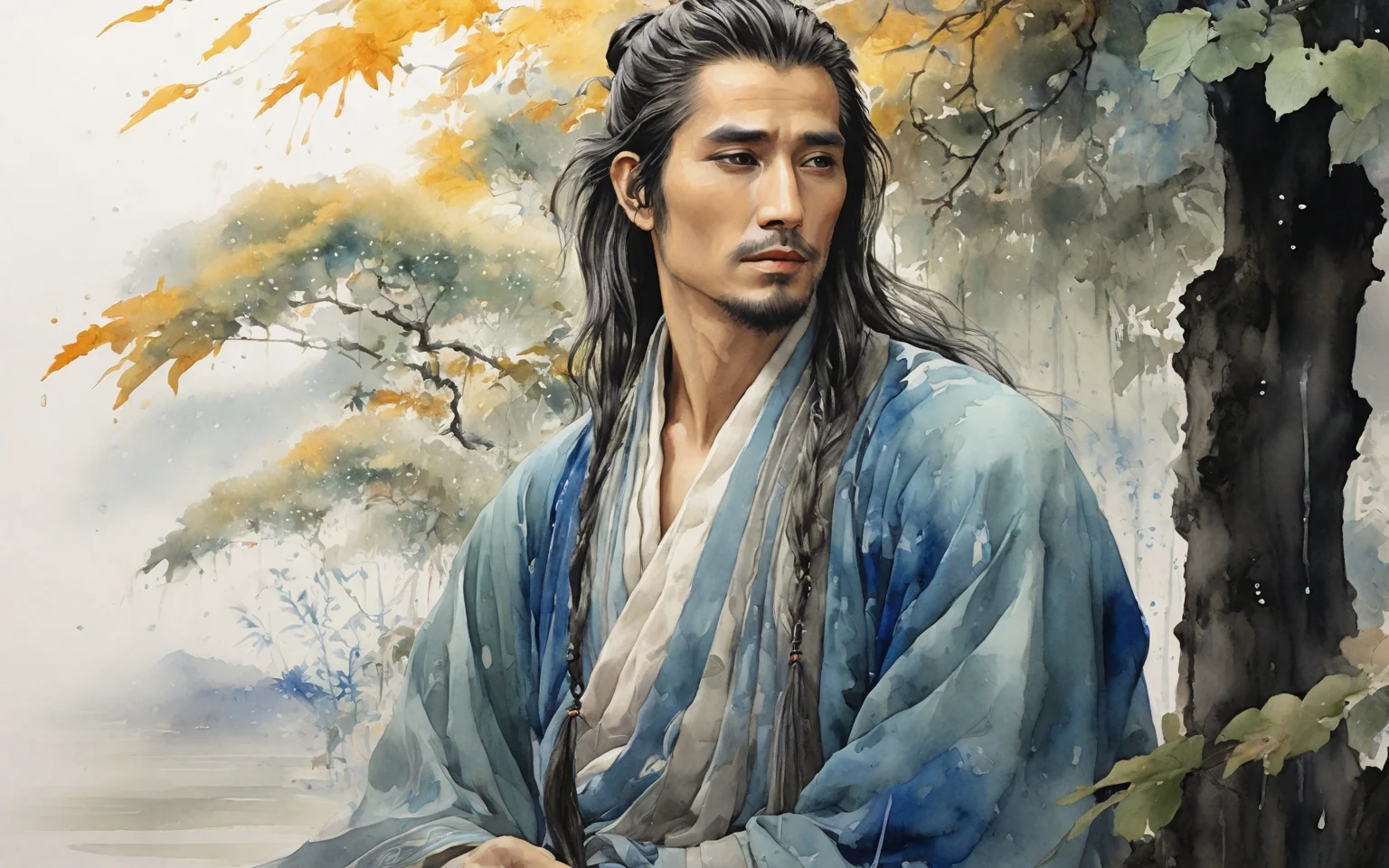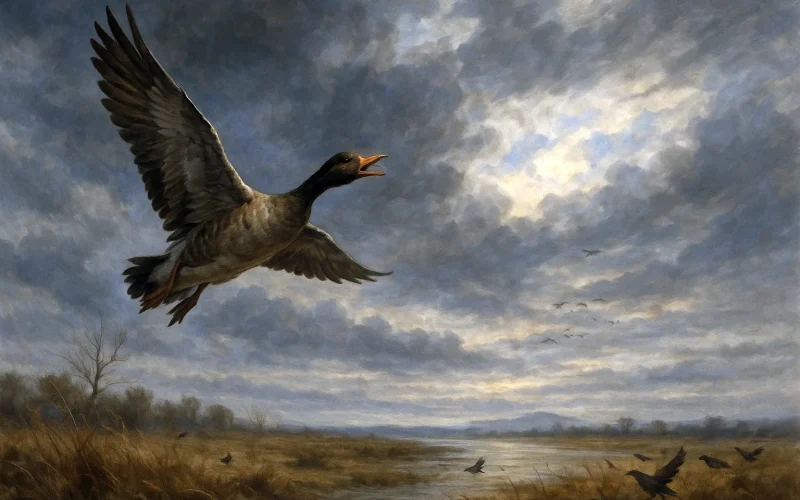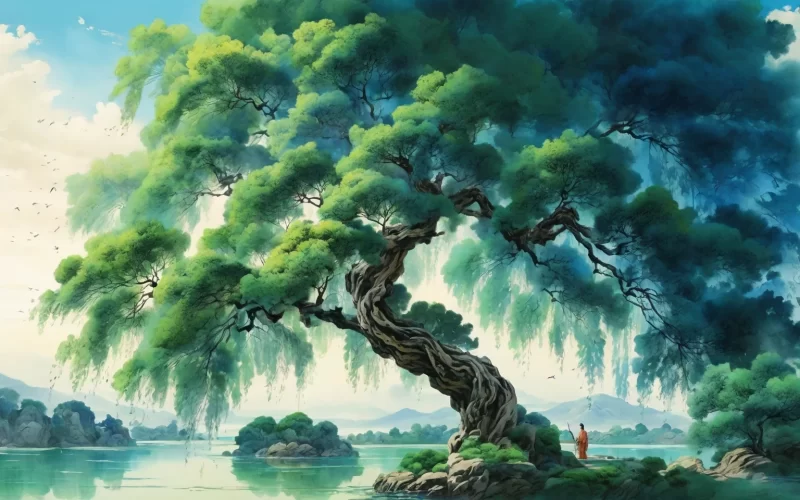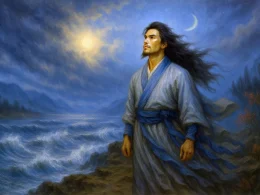The lonely swan won't drink nor eat,
But longs to join its flock to fleet.
Who will pity its shadow lonely,
Astray in the clouds,
it wails only.Out of sight,
still it seems in view;
Lost in grief,
its song's heard anew.
What do insensible birds know?
You hear only caws of the crow.
Original Poem
「孤雁」
杜甫
孤雁不饮啄,飞鸣声念群。
谁怜一片影,相失万重云?
望尽似犹见,哀多如更闻。
野鸦无意绪,鸣噪自纷纷。
Interpretation
This work was composed around 766 CE, the first year of the Dali era under Emperor Daizong, while Du Fu was residing in Kuizhou (present-day Fengjie, Chongqing). The poet was by then in the twilight of his life, having endured warfare, displacement, the loss of old companions, severed contact with loved ones, and the afflictions of poverty and illness. The majestic landscape of Kuizhou only served to accentuate the individual's insignificance and solitude. In autumn, as wild geese flew south, the poet witnessed a solitary straggler—its lonely form and incessant, mournful cries resonated profoundly with his own fate as a wanderer at the world's edge, whose friends were scattered like stars. Pouring all his personal grief and existential anguish into the image of this "solitary wild goose," he forged this poignant poem.
First Couplet: “孤雁不饮啄,飞鸣声念群。”
Gū yàn bù yǐn zhuó, fēi míng shēng niàn qún.
The lonely goose refuses food and will not drink; / In flight, its cries a constant longing for its fellows seem to link.
The opening strikes directly at the core, outlining the creature's most fundamental state. "Refuses food and will not drink" indicates a deep disruption of physical instinct, highlighting profound distress. "In flight, its cries a constant longing…" is the outward eruption and perpetual direction of this pain. These four words fuse action (flight), sound (cries), and emotion (longing), bringing to life an image of a being so consumed by loss that it borders on self-neglect. This mirrors the poet's own spirit amidst turmoil: though suffering privation, his heart remained fixed on his homeland and yearned for his companions.
Second Couplet: “谁怜一片影,相失万重云?”
Shuí lián yī piàn yǐng, xiāng shī wàn chóng yún?
Who pities this lone shadow, small against the sky, / From its own kind lost where endless cloud banks lie?
This couplet uses a powerful spatial contrast to elevate the sense of solitude to a cosmic scale. "This lone shadow" represents a tiny, fragile, almost transparent speck; "endless cloud banks" symbolize vast, deep, and indifferent barriers. The question "Who pities…" is both a plaintive appeal uttered on behalf of the goose and the poet's own desperate inquiry for human compassion. The phrase "lost from its own kind" is saturated with passivity and helplessness, expressing the common fate of individuals in an age of chaos—torn apart and isolated by immense, impersonal forces.
Third Couplet: “望尽似犹见,哀多如更闻。”
Wàng jìn sì yóu jiàn, āi duō rú gèng wén.
Gazing till sight fails, as if old forms it spies; / Lamenting without cease, as if their answering call replies.
Here, the poem portrays the psychological delusion born of extreme longing, marking its peak emotional intensity. "Gazing till sight fails" is a physical极限; "as if old forms it spies" is psychological fixation. "Lamenting without cease" is an overflowing of grief; "as if their answering call replies" is a trick of the mind. The parallelism is formally balanced yet emotionally potent, revealing how, in absolute solitude, the spirit sustains itself through memory and illusion. This illusion of "seeking yet not finding, yet feeling as if found" is more agonizing than simple despair.
Fourth Couplet: “野鸦无意绪,鸣噪自纷纷。”
Yě yā wú yì xù, míng zào zì fēn fēn.
The common crows, devoid of feeling or true thought, / In empty, raucous clamor are self-absorbed, self-caught.
The focus turns sharply, using the vulgar noise of the "common crows" to reflect and set off the profound devotion of the solitary goose. "Devoid of feeling or true thought" and "empty, raucous clamor" vividly sketch a world of beings—numb, shallow, engrossed only in their own commotion. The goose's "longing" is an upward, spiritual quest; the crows' "clamor" is a downward, instinctual racket. This stark contrast not only intensifies the noble tragedy of the goose (and the poet) but also implies a trenchant critique of a world where true connection is rare and values are misplaced.
Holistic Appreciation
This work is a masterpiece of Du Fu's object poetry, achieving the effect of "revealing vast themes through a small focus" and the state of "complete identification between subject and object." The poem's structure is precise, with emotion deepening layer by layer: from external distress (refusing sustenance) → to spatial predicament (lone shadow vs. cloud banks) → to psychological illusion (as if it sees, as if it hears) → finally to environmental foil (the crows' noise). It traces a complete spiritual journey from "separation" through "longing" to a form of transcendent, conscious "aloneness."
The solitary goose is a multi-layered symbol: it is a microcosm of the individual displaced by war, a metaphor for the intellectual's spiritual steadfastness amidst chaos, and an emblem of humanity's eternal yearning for connection and belonging. Through his own visceral pain, Du Fu elevates personal grief into a philosophical contemplation of a universal human plight.
The poem's most compelling power stems from its stance of "persisting in its quest despite despair." The goose, aware it is "lost where endless cloud banks lie," still "gazes till sight fails" and feels "as if old forms it spies"; knowing its laments are unanswered, it laments ceaselessly and imagines a reply. This posture of unwavering pursuit embodies the highest expression of the spiritual integrity found in Du Fu and in the Chinese literati tradition—"though I suffer nine deaths, I shall have no regrets."
Artistic Merits
- Profound Empathy through Personification: The poet does not merely describe but fully identifies with the creature, making it a lyrical subject with complete emotional and volitional life. The boundary between goose and poet dissolves entirely.
- Vast Disparity in Spatial Imagery: The contrast between "lone shadow" and "endless cloud banks" juxtaposes the minuscule scale of individual life against the vast, indifferent cosmos, immensely intensifying the poem's tragic tension and philosophical depth.
- Precise Depiction of Psychological Illusion: Phrases like "as if it spies" and "as if… replies" accurately capture the experience of delusion under extreme emotional strain, rendering abstract anguish concrete and deeply affecting.
- Critical Force of Contrast: The "common crows" serve not only as an aesthetic foil (noise vs. silence) but also as a value-laden critique of a shallow, uncomprehending world, highlighting the noble solitude of the goose's (and poet's) spiritual pursuit.
Insights
This masterpiece poses an eternal question: When an individual is "lost from its own kind" and severed from a meaningful world, how should one live?
The solitary goose's (Du Fu's) answer is: to cling with the resolve of one who "refuses food and will not drink" to inner feeling and value; to resist oblivion with the unceasing call of "constant longing"; and even in the plight of "who pities?" never to descend into the "empty, raucous clamor" of those "devoid of feeling." This is a form of heroism that affirms existence through solitude and insists on meaning within despair.
For the modern individual in a mobile, often isolating society, moments of spiritual "separation" are common. True strength lies not in denial but, like Du Fu's goose, in maintaining a profound capacity for feeling and a persistent spiritual quest within solitude. The sorrow and unwavering commitment of this "longing" are proof that our humanity remains vital. Thus, the poem stands as a deep offering of understanding and solace for solitary souls across all ages.
Poem translator
Xu Yuanchong (许渊冲)
About the poet

Du Fu (杜甫), 712 - 770 AD, was a great poet of the Tang Dynasty, known as the "Sage of Poetry". Born into a declining bureaucratic family, Du Fu had a rough life, and his turbulent and dislocated life made him keenly aware of the plight of the masses. Therefore, his poems were always closely related to the current affairs, reflecting the social life of that era in a more comprehensive way, with profound thoughts and a broad realm. In his poetic art, he was able to combine many styles, forming a unique style of "profound and thick", and becoming a great realist poet in the history of China.












